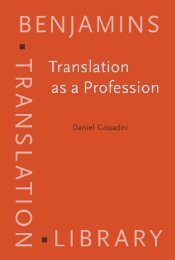Check Your Vocabulary for Academic English.pdf
Check Your Vocabulary for Academic English.pdf
Check Your Vocabulary for Academic English.pdf
- No tags were found...
Create successful ePaper yourself
Turn your PDF publications into a flip-book with our unique Google optimized e-Paper software.
IntroductionWords With Many MeaningsWhen you do look in your dictionary, you may find that one word has many meanings. If you compare these,however, you will often find that they are not so different from each other, so try to look <strong>for</strong> one centralmeaning.Word That Go TogetherRemember also to write down any other words which are often found together with your new word. Forexample, notice in your dictionary that we normally use the word to after the word similar (a 'dependentpreposition') and that it is usually policies, plans or programs and so on which are <strong>for</strong>mulated (examples of'collocations'). This in<strong>for</strong>mation will help you to use the new words correctly.IntroductionTo sum up:decide if the word in the example sentence is a verb, a noun or an adjectiveread the other words to help you guess the meaning of the new wordthen if necessary use your dictionary to select a suitable answerif possible, choose one central meaning <strong>for</strong> the word from the dictionary entrywrite down your new word with an example sentence to help you remember its meaningnote down any dependent prepositions or collocations to help you use the word correctlyAdvice to the TeacherThe purpose of this book is to equip non-native speakers of <strong>English</strong> at upper intermediate level and above witha core of sub-technical vocabulary relevant to the full range of university subjects.It is envisaged that this book will be used to supplement an <strong>English</strong> <strong>for</strong> <strong>Academic</strong> Purposes/Study Skills course,at foundation, undergraduate or postgraduate level. It may either be used in class or be assigned <strong>for</strong> study ona self-access basis.The vocabulary items presented here are based on research by I. S. P. Nation*, which culminated in a series ofapproximately 800 words ranked in sets according to their frequency of occurrence in texts drawn from anumber of very different academic subjects.Since the order of the eleven units presented in this book reflect this ranking, the words in Unit One have awider range of application than those in Unit Two and so on, which means that students should work throughthe book sequentially.Inside the units, each word is presented in an example sentence which aims firstly to provide a context fromwhich students may be able to infer the meaning of the word in question and secondly to give instances ofassociated words such as collocates and dependent prepositions. This <strong>for</strong>m of presentation will allow studentsto find out not only what words mean, but also how to use them.The exercises include gap-filling, word matching, identifying synonyms, matching sentence fragments, andword-completion. In all cases, the style and content of the examples I have written are intended to be typicalof language used in academic contexts.In approaching the exercises, it is vital that students use dictionaries appropriately, and far preferable that theyuse an <strong>English</strong>-<strong>English</strong> learner's dictionary rather than a translation dictionary. Similarly, it is important thatstudents do not regard simply filling in blanks as the sole purpose of this book. Instead, students shouldapproach vocabulary learning actively. This means keeping a vocabulary notebook in which they should beencouraged to write an example <strong>for</strong> each new word, with special attention being paid to any dependentprepositions and collocations.Although the immediate goal is <strong>for</strong> students to learn the words here, if it can encourage students to take amore active, thoughtful approach to vocabulary learning, this book will have succeeded in its wider aim.*Nation, I. S. P. (1990) Teaching and Learning <strong>Vocabulary</strong>. Boston, MA: Heinle & Heinle.© A&C Black Publishers Ltd 2007. For reference see Easier <strong>English</strong> Dictionary <strong>for</strong> Students (978 07475 6624 3).3
















